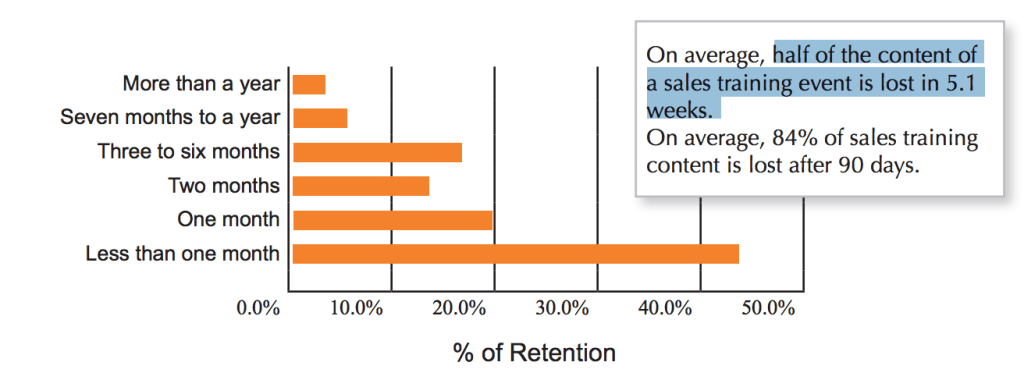Selling a product is no easy task. Without in-depth knowledge and confidence in your abilities, you’re sure to struggle. In this article, we cover five of the sales secrets that turn novice salespeople into great producers.
Bringing new salespeople into the fold injects new life into your business. But it also adds to your workload. If your new people have little experience, you’re going to have to coach them. Imparting your selling skills tips will help them to perform to the standard that you expect.
But it takes more than giving your new hires a few sales secrets. You’re introducing people into a competitive, high-pressure environment. The key sales secrets to success revolve around how you help your new hires adapt to this environment.
That’s where your training comes into play. You have to ask yourself how to improve the sales skills of your new people as quickly as possible.
It’s a difficult task, but it’s one that you have to complete. Thankfully, you’re not alone. Here we examine five of the sales secrets that will help you turn a sales newbie into a seasoned professional.

Secret #1 – Short and Sharp Training Sessions
Have you ever sat in on a long-winded training lecture? Such sessions claim that they’ll help you to improve sales techniques. But by the second hour, you’re doing little more than watching the clock and thinking about how much time you’re wasting.
There’s a simple reason for this. People can only learn and retain so much information before you overload their brains. An all-day sales secrets training session may sound like the best idea in the world. You have a full day to immerse your team in the sales process, after all. But you’ll soon find that your people only retain a small amount of what you teach during these long sessions. That means you’ve wasted time and money on something that you’re going to have to re-teach.
A Sales Performance International study backs this up. It examined a range of multi-day sales secrets training events. The study discovered that participants forget about half of what they’re taught during these events within five weeks:

Figure 1 – https://www.yesware.com/blog/sales-training/
Even more worryingly, 84% of the training disappears after about 13 weeks.
The solution? Keep your training sessions small and focussed. Only cover one or two topics and encourage your new salespeople to apply what they’ve learned. Once the training session concludes, send out little reminder emails to help your people remember to apply what they learned.
Ideally, your sessions shouldn’t last much longer than 15 minutes. This is the prime time period for keeping somebody’s attention. After that, they have little lapses in their attention spans that lead to them missing out on information. These lapses become longer as the session drags on. If you’re covering a huge amount of topics in one go, the effect becomes worse.
Martial arts movie star Bruce Lee said something that applies here:
“I fear not the man who has practiced 10,000 kicks once, but I fear the man who has practiced one kick 10,000 times.”
Huge training sessions cover dozens of topics once and never touch on them again. That’s why people lose so much information over time. Short and focussed sessions encourage people to devote their energy to learning specific things. They repeat and hone the skill taught in the session, which makes them more effective.
Secret #2 – Leverage Your Existing Sales Team
The first three months of a new salesperson’s career are among the most stressful. They’re introduced to a brand new environment and have to learn everything they can about your products and services. On top of that, they’re getting bombarded with selling skills tips.
It’s a huge amount of pressure. They’ll worry about their early performance and how it reflects on them. They’ll panic when things go wrong or when they make mistakes. In the end, this can lead to the demotivation that turns a promising salesperson into a bad hire.
How you use these first few months has a massive influence on the success of your new people. This is where your existing sales team can help.
When you bring new people in, have some of your more experienced salespeople look out for them. Assign each new salesperson to a veteran who’s there to help with any questions the new hire may have.
Your new hires will appreciate having a mentor who’s dedicated to dealing with their concerns. Moreover, they’ll learn some of the sales secrets to success that are most relevant to your business. Most importantly, they’ll have somebody to talk to when the pressure mounts.
Using your existing sales team to help train your new salespeople has several benefits. It keeps new salespeople motivated. It shows existing salespeople that you trust them enough to work as mentors. Plus, this technique cuts down on the early mistakes that can demoralise a new salesperson.
Best of all, it doesn’t cost you a penny. However, you may want to offer some form of incentive for your mentors to do the best they can with your new hires.
Secret #3 – Share Sales Successes
An engaged sales team will always achieve results. A study conducted by the National Business Research Institute demonstrates this. It says that the attitude of your salespeople affects between 40% and 80% of customer satisfaction ratings.
Moreover, the same study looked at the engagement statistics of a major retailer. It discovered that a single percent uptick in engagement resulted in a $200,000 sales increase per store.
As you can see, engagement is one of the key sales secrets to success.
So, how do you keep your new salespeople engaged?
It comes down to sharing and celebrating in their success. When you celebrate your people’s achievements, you show them that the organisation cares about them. You’re also telling them that you appreciate the work that they’re putting in for you.
Sharing also encourages unity within your sales team. A united team will bolster each individual’s confidence. Each member knows that they’re achieving success and they’ll keep pushing harder to achieve more. After all, they know that you’re going to celebrate their achievements.
It’s all about confidence. When people receive recognition for what they do, it shows them that they’re on the right path. Moreover, it marks these people out as examples for the rest of the team to follow.
The end result is a more engaged and cohesive sales team that achieves results.
There are several ways to celebrate and share successes. Some organisations keep a running tally of sales that highlights the top performers. Others hold group meetings dedicated to celebrating achievements. Some may even have a company newsletter or intranet that they can use to highlight successes. The key is that you’re acknowledging hard work, which shows new salespeople that you care.
Secret #4 – Teach Them About the Organisation
Sometimes, it can feel like you only need to teach selling skills tips to your new people. After all, sales generally works the same way, regardless of the organisation, right?
Wrong!
Your organisational structure dictates how you approach selling. A talented new salesperson may still fail if they don’t understand what makes your organisation tick. It’s about much more than teaching general sales secrets. Your people must understand how all of the departments within your organisation work together.
Company-focused training sessions can help you to achieve this. So too can having your new salespeople talk with the heads of each department. Set up a training routine that shows your new people how everything slots together. This means they know who to talk to for specific issues that may arise in their work.
When your new people know about the organisation, they can approach their work with confidence. From there, you can help them learn about the sales secrets that improve their results.
Secret #5 – Provide Constant Feedback and Analysis
While it’s important to foster a healthy team culture, your salespeople also need individual attention. They want feedback to come directly to them from their managers. This helps them to pick up on issues and improve sales techniques.
Hold regular individual sessions with your salespeople. Use these sessions to discuss the individual’s performance. Focus on the positives as much as possible. You don’t want the person to leave the session feeling demoralised. However, you can also use these sessions to discuss things that aren’t going as well as you’d hoped. Offer your feedback on the negatives as well as the positives. Most importantly, provide actionable advice whenever you point out something that a new person can do better. This gives them something to focus on, rather than leaving them feeling like they can’t do the job.
The data you collect on your team goes a long way towards informing these feedback sessions. This information shows you when somebody exceeds expectations and where they’re struggling. You can then use this to figure out a plan of action for the individual.
One final point – don’t just focus on business. Get to know a little bit about the person behind the employee. This creates a stronger bond between manager and employee that drives engagement. Moreover, it clues you into the key motivators that you can use to improve that person’s performance.

The Final Word
Entering a new sales environment is a stressful experience for anybody. How you approach your training has a huge effect on how well new hires absorb your sales secrets. Do the following to turn novices into world-class producers:
- Avoid long-winded, multi-day teaching sessions. Your people don’t learn as well from them as they do from short, focused sessions.
- Provide regular feedback to individuals.
- Find a way to recognise exemplary performance.
- Have your experienced salespeople provide advice and mentorship to your new hires.
- Teach new hires about your organisation’s structure and processes, as well as its products and services.
Of course, it isn’t easy to implement these training ideas all at once. That’s where CUB Network can help.
At CUB our ambition is to unite those who are changing the world through their businesses. We support these people by building a private community of Australia’s next titans of industry. And we bring these titans together to accelerate the achievement of each other’s ambitions.
If you wish to be considered for membership, please feel free to request a club introduction on our membership page: www.cub.club/membership.











